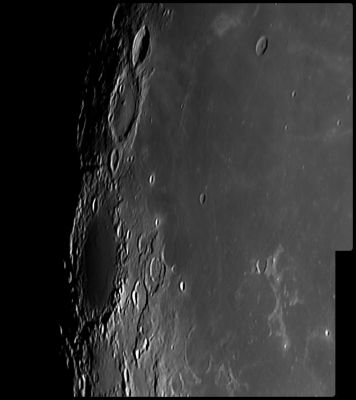Difference between revisions of "Cavalerius"
| Line 6: | Line 6: | ||
|} | |} | ||
<div id="toc"> | <div id="toc"> | ||
| − | [http://www.lpod.org/coppermine/displayimage.php?pid=750&fullsize=1 [[Image: | + | [http://www.lpod.org/coppermine/displayimage.php?pid=750&fullsize=1 [[Image:Normal_Hevelius050916.jpg|external image normal_Hevelius050916.jpg]]]<br /> ''[http://lpod.org/coppermine/displayimage.php?pos=-750 Peter Lloyd]'' '''Cavalerius''' is at the top of the image (the crater with the deep shadow). South of it are '''Hevelius''', '''Lohrmann''', and '''Grimaldi'''.<br /> <br /> |
==Images== | ==Images== | ||
[http://www.lpod.org/coppermine/thumbnails.php?album=search&type=full&search=Cavalerius LPOD Photo Gallery] [http://www.lpi.usra.edu/resources/lunar_orbiter/bin/srch_nam.shtml?Cavalerius%7C0 Lunar Orbiter Images]<br /> | [http://www.lpod.org/coppermine/thumbnails.php?album=search&type=full&search=Cavalerius LPOD Photo Gallery] [http://www.lpi.usra.edu/resources/lunar_orbiter/bin/srch_nam.shtml?Cavalerius%7C0 Lunar Orbiter Images]<br /> | ||
| Line 19: | Line 19: | ||
<br /> | <br /> | ||
==Description: Elger== | ==Description: Elger== | ||
| − | ''([[IAU% | + | ''([[IAU%20directions|IAU Directions]])'' CAVALERIUS.--The most northerly member of the linear chain, a ring-plain, 41 miles in diameter, with terraced walls rising about 10,000 feet above the floor. Within there is a long central mountain with three peaks. Under a high light the region on the E. is seen to be crossed by broad light streaks.<br /> <br /> |
==Description: Wikipedia== | ==Description: Wikipedia== | ||
[http://en.wikipedia.org/wiki/Cavalerius_(crater) Cavalerius]<br /> <br /> | [http://en.wikipedia.org/wiki/Cavalerius_(crater) Cavalerius]<br /> <br /> | ||
==Additional Information== | ==Additional Information== | ||
| − | * Depth data from [[Kurt%20Fisher% | + | * Depth data from [[Kurt%20Fisher%20Crater%20Depths|Kurt Fisher database]]<br /> Westfall, 2000: 3.6 km<br /> Viscardy, 1985: 3 km<br /> Cherrington, 1969: 3.29 km |
* Central peak height | * Central peak height | ||
| − | ** [[Sekiguchi%2C%201972|Sekiguchi, 1972]]: 1.1 km <span class="membersnap">- [http://www.wikispaces.com/user/view/fatastronomer [[Image: | + | ** [[Sekiguchi%2C%201972|Sekiguchi, 1972]]: 1.1 km <span class="membersnap">- [http://www.wikispaces.com/user/view/fatastronomer [[Image:Fatastronomer-lg.jpg|16px|fatastronomer]]] [http://www.wikispaces.com/user/view/fatastronomer fatastronomer]</span> |
* [http://www.lpod.org/coppermine/displayimage.php?album=42&pos=0 Cavalerius E] is a [[concentric%20crater|concentric crater]]. | * [http://www.lpod.org/coppermine/displayimage.php?album=42&pos=0 Cavalerius E] is a [[concentric%20crater|concentric crater]]. | ||
* Exterior impact melt deposits most extensive to NE, max of ~5 km beyond rim. Most extensive ejecta, rays and secondary craters to the ESE, with max wall slumping on SSW side of crater, and topographically lowest rim crest to N & S ([[Hawke%20and%20Head%2C%201977|Hawke and Head, 1977]]). | * Exterior impact melt deposits most extensive to NE, max of ~5 km beyond rim. Most extensive ejecta, rays and secondary craters to the ESE, with max wall slumping on SSW side of crater, and topographically lowest rim crest to N & S ([[Hawke%20and%20Head%2C%201977|Hawke and Head, 1977]]). | ||
Revision as of 01:44, 16 April 2018
Contents
Cavalerius
|
Lat: 5.1°N, Long: 66.8°W, Diam: 57 km, Depth: 3.6 km, Rükl: 28, Eratosthenian |

Peter Lloyd Cavalerius is at the top of the image (the crater with the deep shadow). South of it are Hevelius, Lohrmann, and Grimaldi.
Images
LPOD Photo Gallery Lunar Orbiter Images
- Cavalerius E, the 44th item in C.A.Wood's list of Concentric Craters (1978), is noticeable near the upper margin of Lunar Orbiter 4's photograph LOIV-169-h1.
- Research: Danny Caes
- Cavalerius was photographed during the mission of Apollo 17 in december 1972. This crater was captured near the right margin of NIKON-camera frame AS17-158-23899 (made in earthlight). Previous photograph 23898 shows Cavalerius just above centre of frame (between the centre and the curved horizon).
- Research orbital Apollo 17 photography: Danny Caes
Maps
(LAC zone 56D1) LAC map Geologic map
Description
Description: Elger
(IAU Directions) CAVALERIUS.--The most northerly member of the linear chain, a ring-plain, 41 miles in diameter, with terraced walls rising about 10,000 feet above the floor. Within there is a long central mountain with three peaks. Under a high light the region on the E. is seen to be crossed by broad light streaks.
Description: Wikipedia
Additional Information
- Depth data from Kurt Fisher database
Westfall, 2000: 3.6 km
Viscardy, 1985: 3 km
Cherrington, 1969: 3.29 km - Central peak height
- Sekiguchi, 1972: 1.1 km - fatastronomer fatastronomer
- Cavalerius E is a concentric crater.
- Exterior impact melt deposits most extensive to NE, max of ~5 km beyond rim. Most extensive ejecta, rays and secondary craters to the ESE, with max wall slumping on SSW side of crater, and topographically lowest rim crest to N & S (Hawke and Head, 1977).
- Small pyroclastic deposit (area = 880 km^2). Gaddis, L. (1999) Lunar Pyroclastic Volcanism Project.
- TSI = 35, CPI = 30, FI = 20; MI =85 Smith and Sanchez, 1973
Nomenclature
- Bonaventura Francesco Cavalieri (Cavalerius) (1598 - November 30, 1647) was an Italian mathematician known for Cavalieri's principle, which states that the volumes of two objects are equal if the areas of their corresponding cross-sections are in all cases equal. Cavalieri developed a "method of the indivisibles," which he used to determine areas and volumes. It was a significant step on the way to modern infinitesimal calculus. He was introduced to Galileo through academic and ecclesiastical contacts. Cavalieri would write at least 112 letters to Galileo. Cavalieri also constructed a hydraulic pump for his monastery and published tables of logs, emphasizing their practical use in the fields of astronomy and geography.
- Rima Cavalerius B (a curious rille seeker's name for the rille on the floor of Cavalerius B).
- Rima Cavalerius D (a name from an amateur explorer of the lunar surface for a rille on the floor of Cavalerius D).
LPOD Articles
Bibliography
Coombs, CR & BR Hawke (1992) Pyroclastic deposits on the western limb of the Moon. Proc. Lunar Planet. Sci. 22, 303-312.